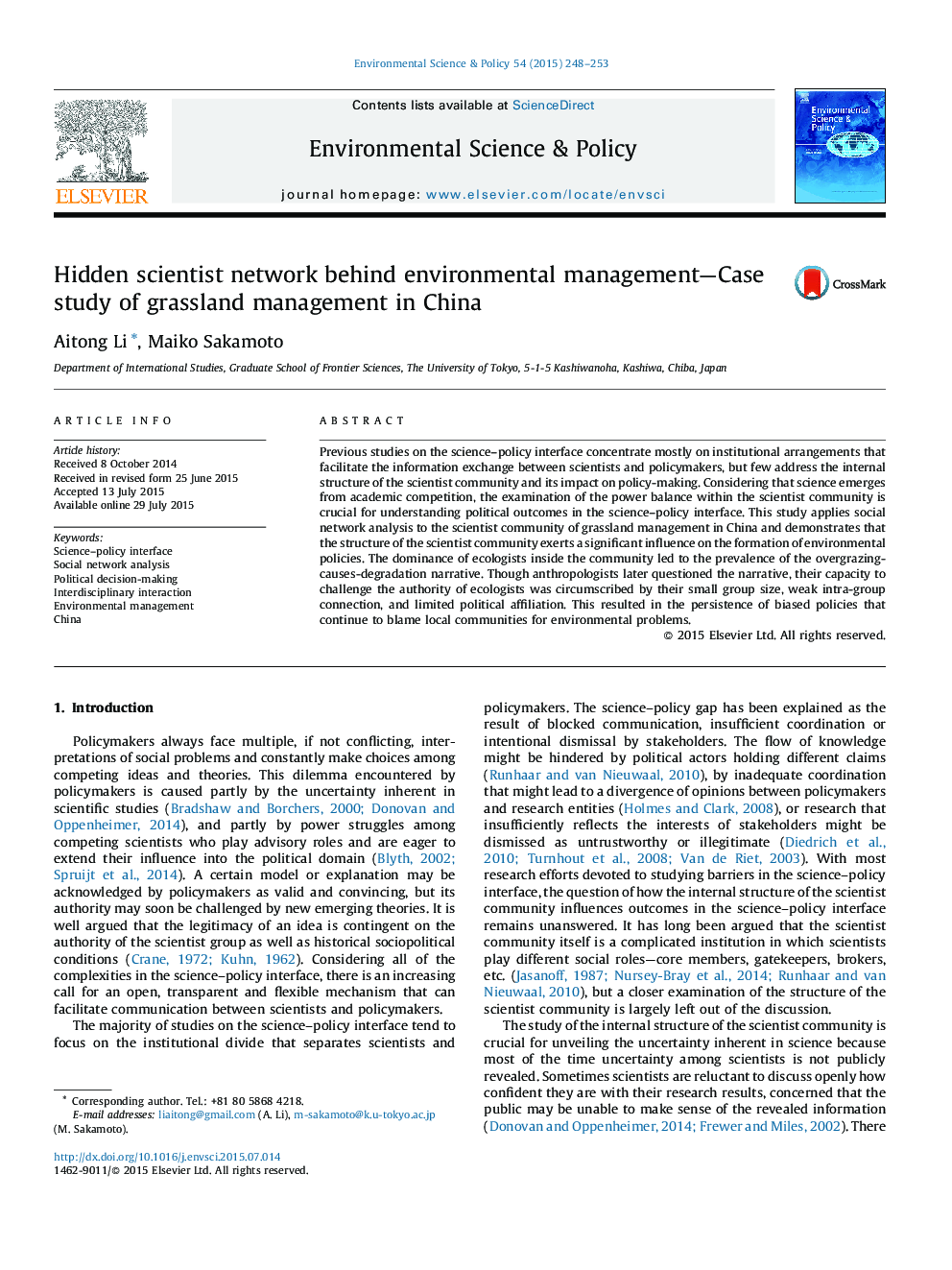| کد مقاله | کد نشریه | سال انتشار | مقاله انگلیسی | نسخه تمام متن |
|---|---|---|---|---|
| 7467279 | 1485053 | 2015 | 6 صفحه PDF | دانلود رایگان |
عنوان انگلیسی مقاله ISI
Hidden scientist network behind environmental management-Case study of grassland management in China
ترجمه فارسی عنوان
شبکه دانشمندان مخفی در مدیریت زیست محیطی - مطالعه موردی مدیریت چمنزار در چین
دانلود مقاله + سفارش ترجمه
دانلود مقاله ISI انگلیسی
رایگان برای ایرانیان
کلمات کلیدی
علم سیاست رابط، تجزیه و تحلیل شبکه شبکه، تصمیم گیری سیاسی تعامل بین رشته ای، مدیریت زیست محیطی، چین،
ترجمه چکیده
مطالعات قبلی در مورد رابطۀ سیاست علمی بیشتر بر ترتیبات نهادی تأکید می کند که تبادل اطلاعات بین دانشمندان و سیاست گذاران را تسهیل می کند، اما تعداد کمی از ساختار داخلی جامعه دانشمند و تاثیر آن در سیاست گذاری را مورد توجه قرار می دهد. با توجه به اینکه علم از رقابت دانشگاهی ظاهر می شود، بررسی تعادل قدرت در جامعه دانشمند برای درک نتایج سیاسی در رابطۀ سیاست علمی بسیار مهم است. این مطالعه تجزیه و تحلیل شبکه اجتماعی را به جامعه دانشمند مدیریت چمنزار در چین تحویل می دهد و نشان می دهد که ساختار جامعه دانشمند تأثیر قابل توجهی در شکل گیری سیاست های زیست محیطی دارد. تسلط اکولوژیست ها در داخل جامعه منجر به شیوع روایت تخریب علل پرخوری شد. اگرچه انسان شناسان بعدها این روایت را مورد پرسش قرار دادند، ظرفیت آنها برای مبارزه با اقتدار اکولوژیست ها به واسطه گروه کوچک آنها، اتصال ضعیف درون گروهی و وابستگی سیاسی محدود بود. این منجر به تداوم سیاست های غلط است که همچنان به محکوم کردن جوامع محلی به مشکلات زیست محیطی ادامه می دهد.
موضوعات مرتبط
مهندسی و علوم پایه
مهندسی انرژی
انرژی های تجدید پذیر، توسعه پایدار و محیط زیست
چکیده انگلیسی
Previous studies on the science-policy interface concentrate mostly on institutional arrangements that facilitate the information exchange between scientists and policymakers, but few address the internal structure of the scientist community and its impact on policy-making. Considering that science emerges from academic competition, the examination of the power balance within the scientist community is crucial for understanding political outcomes in the science-policy interface. This study applies social network analysis to the scientist community of grassland management in China and demonstrates that the structure of the scientist community exerts a significant influence on the formation of environmental policies. The dominance of ecologists inside the community led to the prevalence of the overgrazing-causes-degradation narrative. Though anthropologists later questioned the narrative, their capacity to challenge the authority of ecologists was circumscribed by their small group size, weak intra-group connection, and limited political affiliation. This resulted in the persistence of biased policies that continue to blame local communities for environmental problems.
ناشر
Database: Elsevier - ScienceDirect (ساینس دایرکت)
Journal: Environmental Science & Policy - Volume 54, December 2015, Pages 248-253
Journal: Environmental Science & Policy - Volume 54, December 2015, Pages 248-253
نویسندگان
Aitong Li, Maiko Sakamoto,
